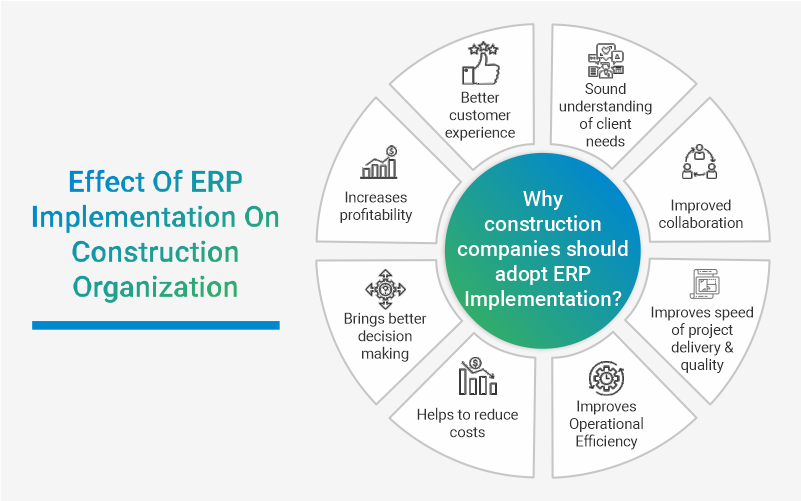Last Updated on November 23, 2023 by softtech
Construction companies today are facing unprecedented challenges. Disruptive innovations, stricter regulations and a volatile economic climate is forcing businesses to rethink their operations, processes and technology systems. To remain competitive in the long run, construction firms need to streamline their operations and adopt new technologies that can help them achieve faster turnaround times, lower costs and higher efficiency with reduced waste and errors. Implementing Enterprise Resource Planning (ERP) system is one of the best ways for construction firms to achieve these objectives.
What is an ERP?
ERP is a set of integrated software applications that are designed to meet the needs of the entire organization — from sales, supply chain, marketing, finance, and human resource departments. A single, unified system is designed to streamline business operations, increase efficiency, and improve the bottom line. ERP is the backbone of any organization’s operations and business strategy. It integrates with your company’s existing systems (like accounting, customer relationship management, and project management) to give you a broader view of your business and make better decisions for your organization.
Why is implementing an ERP crucial for construction firms?
Construction companies today have to contend with a host of challenges that include an ageing workforce, a skills shortage, a more stringent regulatory environment, and a volatile economic situation. The industry is expected to grow in the coming years, which creates new opportunities for construction firms. At the same time, these companies must be smarter about how they use resources and operate their businesses. Efficient resource management, seamless collaboration across teams, and effective project delivery are critical for staying competitive in the industry. Construction organizations can greatly benefit by implementing an integrated business system. An ERP can help construction businesses become more efficient and profitable through standardization and automation. ERPs enable organizations to manage their business processes, end-to-end. They also allow firms to expand their business by growing their client base and serving more customers.
4 reasons why construction companies should adopt ERP Implementation

Better Customer Experience
One of the biggest advantages of ERP is the ability to deliver consistent customer experiences across channels. An ERP system can help construction businesses to better understand their customers, their needs, and their preferences.
Improved Collaboration
Another major advantage of ERP is the ability to encourage collaboration within the organization. Companies can more easily share data across teams, departments, and locations. This can help construction firms speed up project delivery, improve quality, and enhance customer satisfaction.
Improved Operational Efficiency
Finally, a construction organization’s ability to manage its business through an integrated system like ERP can help improve operational efficiency. This can lead to significant cost reductions and increase the bottom line.
Better Decision-Making
An ERP system can provide businesses with a broader view of their operations, enabling them to make better decisions. This can help construction companies increase profitability and stay competitive.
Impact of ERP implementation on construction firms
ERP systems use a modular design to provide a variety of applications needed by most enterprises in a single framework. These software packages share a single database and combine functions like accounting and procurement into a single application. Therefore, depending on its needs, an organisation may select a suitable module. ERP information systems include every area of a firm, including its people, processes, technology, and organizational structure. ERP software aims to improve a company in all of its elements.
Here’s how the organization elements as influenced by ERP implementation.
Work Process
ERP process helps to align the supply chain management process. ERP offers on-time access to manufacturing, inventory, logistics related information. ERP ensures prompt service delivery to the customers.
Technology
ERP implementation helps to improve the efficiency of the organization’s systems. ERP helps to integrate technology with systems and data bases.
Worker Assistance
ERP helps to bring about employee development, empowerment and job satisfaction. ERP implementation reduces the work burden on employees and ensures routine activities are carried out on time.
Conclusion
Construction is one of the oldest industries in the world, and, despite massive technological advancements, it has seen only limited change in its operating methods. This is why today, construction companies face many challenges that stem from outdated technology systems, inefficient processes, and a lack of visibility into their operations and activities. Implementing an ERP system can help construction businesses overcome these challenges by streamlining operations, improving collaboration, and enabling better decision-making.
Unleash the power of CivitBUILD, our Advanced ERP software. Discover its benefits now!
About Author
Olivia Jones
Technology Specialist
Olivia is a highly skilled and experienced Technology Specialist with 10+ years of hands-on expertise in the rapidly evolving field of technology. She has a proven track record of successfully implementing and managing a wide range of technological solutions, ensuring optimal performance and efficiency. Olivia possesses a deep understanding of industry trends and emerging technologies, enabling her to provide strategic guidance and drive innovation within organizations. With a strong focus on problem-solving, she consistently delivers tailored solutions that align with business objectives while maximizing productivity and cost-effectiveness.
About SoftTech Engineers
A leading IT company (www.softtech-engr.com) facilitating business and technology transformation across the AEC industry through innovative software products and solutions. Equipped with 25+ years of deep domain expertise and industry knowledge, SoftTech has helped more than 4500 clients & government organizations, with more than 25000 users in India and around the world to gain a competitive edge and lead from the front in the industry.

